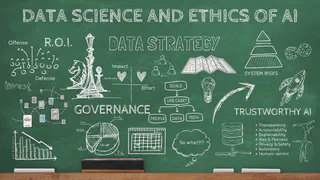Evolving Landscape of Data Science Leadership Education

The dynamic nature of teaching is truly amazing. Yesterday, we concluded another term for my Data Science and Ethics of AI class at the Asian Institute of Management (AIM), and I am continually amazed by the teaching experience. 🥰 Despite seven years of leading this course, the diverse perspectives and experiences of each new cohort never fail to breathe new life into our discussions and bring fresh ideas to the forefront. This is classic emergence in complex systems. And I think it’s beautiful. 😍
This course, strategically positioned in the first term of our students’ data science journey, serves as a crucial foundation. Its placement is intentional, designed to provide students with a holistic view of the field before they dive deeper into technical specifics. By understanding the big picture early on, students can better appreciate the thoughtful design of AIM’s program and its ultimate goal: to develop well-rounded data science leaders. In this course, my goal is also to help them find their “why” in the program.
The Power of Diverse Perspectives
In our final interactive lecture session, we revisited key themes that have emerged throughout the term. There was the critical importance of asking the right questions in data science, a skill that often distinguishes truly impactful leaders in the field. Students also grasped the nuance of choosing the right level of analytics for each unique situation, understanding that sometimes, simpler methods yield the most actionable insights. Perhaps most crucially, we emphasized that the true value in data science lies not in the sophistication of our methods, but in the insights we uncover and how we apply them. These foundational concepts form the backbone of effective data science leadership, guiding decisions and strategies in the ever-evolving realm of data-driven decision making.
Real-World Challenges Brought to Life
What makes each term unique is how students bring their own experiences and perspectives to these foundational concepts. This is, after all, grad school. For the MSDS 2025 cohort, discussions ranged from finding the right balance between data strategy offense and defense to navigating the weighty responsibility of making final calls as data leaders. We tackled challenging scenarios that these future leaders might face (some, already facing):
- How to proceed when leadership, lacking technical understanding, demands the impossible.
- Strategies for handling situations where team capabilities are being “oversold,” potentially overextending resources.
One particularly intriguing point raised this term was the potential pitfall of over-hiring experts in enterprise settings—a fascinating paradox of having top-tier talent that ends up underutilized.
The Continuous Evolution of Shaping Holistic Data Science Leaders
What strikes me year after year is how these discussions evolve. While the core principles remain constant, the contexts in which we apply them are ever-changing. The questions and scenarios brought forth by students serve as a barometer for the current challenges in the field and often provide glimpses into emerging trends. With MSDS 2019, for example, roles like data scientist or CDOs weren’t as plentiful as they are now, where about a handful of my current students already hold data-related positions, some as individual contributors and others as managers.
By diving into these very diverse and multifaceted topics, our aim is to help students appreciate both the challenges and the beauty inherent in being a data science leader. As I always emphasize in class, this is not just about acquiring the needed technical skills; but it is also about nurturing a nuanced understanding of the ethical, strategic, and interpersonal dimensions of their chosen field. It’s leadership, at the end of the day.
As an educator, witnessing the growth of my students is incredibly rewarding. Seeing them grapple with complex ideas and emerge with deeper, more nuanced understandings reaffirms the value of our program’s approach.
So, yes, as we conclude another term, I’m reminded of why this course, despite its familiarity, remains a highlight of my teaching experience. 🥰 The continuous influx of fresh perspectives from students keeps the material vibrant and relevant. It challenges me, as an educator (and practitioner), to constantly refine and adapt my approach.
I’m really excited to see how future cohorts will further shape and evolve our discussions.